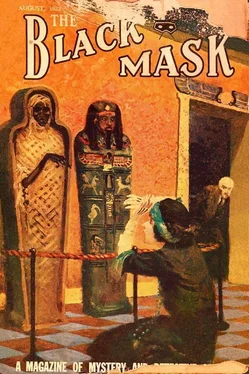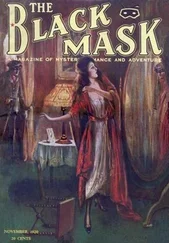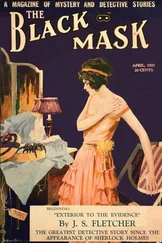John Baer - The Black Mask Magazine (Vol. 5, No. 5 — August 1922)
Здесь есть возможность читать онлайн «John Baer - The Black Mask Magazine (Vol. 5, No. 5 — August 1922)» весь текст электронной книги совершенно бесплатно (целиком полную версию без сокращений). В некоторых случаях можно слушать аудио, скачать через торрент в формате fb2 и присутствует краткое содержание. Город: New York, Год выпуска: 1922, Издательство: Pro-Distributors Publishing Company, Жанр: Детектив, на английском языке. Описание произведения, (предисловие) а так же отзывы посетителей доступны на портале библиотеки ЛибКат.
- Название:The Black Mask Magazine (Vol. 5, No. 5 — August 1922)
- Автор:
- Издательство:Pro-Distributors Publishing Company
- Жанр:
- Год:1922
- Город:New York
- ISBN:нет данных
- Рейтинг книги:4 / 5. Голосов: 1
-
Избранное:Добавить в избранное
- Отзывы:
-
Ваша оценка:
- 80
- 1
- 2
- 3
- 4
- 5
The Black Mask Magazine (Vol. 5, No. 5 — August 1922): краткое содержание, описание и аннотация
Предлагаем к чтению аннотацию, описание, краткое содержание или предисловие (зависит от того, что написал сам автор книги «The Black Mask Magazine (Vol. 5, No. 5 — August 1922)»). Если вы не нашли необходимую информацию о книге — напишите в комментариях, мы постараемся отыскать её.
The Black Mask Magazine (Vol. 5, No. 5 — August 1922) — читать онлайн бесплатно полную книгу (весь текст) целиком
Ниже представлен текст книги, разбитый по страницам. Система сохранения места последней прочитанной страницы, позволяет с удобством читать онлайн бесплатно книгу «The Black Mask Magazine (Vol. 5, No. 5 — August 1922)», без необходимости каждый раз заново искать на чём Вы остановились. Поставьте закладку, и сможете в любой момент перейти на страницу, на которой закончили чтение.
Интервал:
Закладка:
It was true that Hanley had not personally profited by his fraudulent act. Badly advised by his tempters, he had lost every penny of the sum he had embezzled. There were also extenuating circumstances, but the men who had been Hanley’s friends did not wish to continue their association with him, even though some of them refused to prosecute. Others were not so conditionally forgiving, and he had found himself facing a warrant. The woman he loved gave him his congé. Those to whom he appealed for loans to replace what he had stolen turned from him in cold contempt. He was a social outcast — a fugitive from justice — and a penniless, broken-hearted man.
Only Richard Morely had stood by him. It was Morely who hustled him aboard the train for Canada before the police could arrest him; Morely who arranged his passage on the big P. & O. steamer; and Morely who had given him a job. The whole affair culminated at the time Morely was forming his Yellow Dragon Trading Company. The business was a modest one and demanded but little of its manager besides routine attention. It practically operated itself, yet it was a profitable enterprise and enabled Morely to pay Hanley an adequate salary. That his doing so was little more than charity everyone knew. A local Chinese bank could have handled the matter and undoubtedly would have done so much better than Hanley could.
But for over a score of years Hanley had spent his days in the little office near the Bund and his nights in the adjoining bungalow, just beyond the European quarter of the city. He belonged to no clubs and had but few intimates — chiefly those of his own ilk, who railed at the despicable climate of Shanghai, despite the fact that they found it more healthy to remain there than to go home. He was a man of pleasing personality and pleasant manners, reserved and soft spoken. He did not play the races and he did not gamble, so far as anyone knew. Most of his spare time was spent alone with his books, and if a woman appeared now and then in his life, no one was aware of it.
The only living being who really understood Hanley was his native housekeeper, and even Ah Fu was somewhat mistaken in his estimate of the man. At first Hanley had been aided by two assistants, but in time the business grew so automatic, and so relatively unimportant to its owner, that Morely directed him to do without any clerks. Willingly Hanley had dismissed them, and when he had done so, Ah Fu laughed in his flowing sleeve. He had seen for some time that his employer had been ill at ease, and he thought that Hanley breathed a sigh of relief when the others were gone.
Ah Fu also knew that Hanley spent very little. He knew that a tidy sum, to which Hanley was ever adding, lay safe in the Manchu Bank. What was more, Ah Fu had gathered that Hanley was discontented, and would welcome the day when his exile might be over — if ever, indeed, that day should really dawn. Hanley hoped it would, and Ah Fu hoped so too; for the Chinaman longed to see the rest of the world. He knew that Hanley had grown so used to him that he would keep him as his servant for the rest of his days. Hence the departure of Hanley from Shanghai would mean the beginning of the travels of which Ah Fu dreamed.
Hanley had taught him English and something of the business. He had loaned him books and told him stories of other countries, as well as making Ah Fu a sort of secretary. By the time the Chinaman had mastered the spelling of English he had contrived to pick it out on the keys of a typewriter. He would make up long statements each January and July, from lists of figures supplied him by his master. These lists Hanley would compile from the private books he kept — books that were always under lock and key and which no one but Hanley ever looked into.
Morely had not been out to Shanghai since the day of Hanley’s arrival, and the letters the two exchanged were formal in the extreme. Morely had not wished to humiliate his friend by referring to personal matters, and Hanley had not presumed upon the other’s kindness to make their communications savor in any way of a casual correspondence.
All of which was well enough as long as Morely lived, but shortly after the world war Morely suddenly died. He had not been married and consequently had no direct heirs, but Hanley learned in due time that the estate had been left to a distant cousin. The man’s name was Burson and he lived in San Francisco. It seemed that he had never traveled to the Orient and was suddenly possessed of a strong desire to do so.
Hanley dreaded his visit on several scores, neither of which he took occasion to mention to Ah Fu, feeling that the Chinaman could never understand, and that, in any event, it was none of the servant’s business. Hanley believed in keeping his own counsel and in living much by himself, although he was aware that Ah Fu as well as all Shanghai knew of the events which had resulted in his coming there to live.
Yet if Ah Fu was honest himself, whether because of virtue, or perhaps from necessity, he seemed to hold no contempt for Hanley on account of his criminal record. In fact, Ah Fu felt that a man who was crafty enough to take advantage of another in the matter of money was a person to be regarded with the greatest of respect. So he typed his letters and made Hanley’s bed, and cooked his employer’s meals, without concerning himself as to what was written in those mysterious books whose pages his eyes had never scanned. But Ah Fu grew troubled as Hanley’s annoyance seemed to increase.
Other letters from San Francisco caused Hanley sleepless nights, and Ah Fu observed with concern that Hanley no longer relished the food he prepared. He wondered whether something might not be wrong, and whether he could not somehow set that matter right. Knowing that Hanley had once been a thief, the Chinaman supposed that he might be again. He shrewdly surmised’ that those guarded books would divulge the story, if the actual figures in them were ever to become known. That Hanley doctored the financial statements he sent out twice a year, Ah Fu had no doubt. To be able to do such a thing, and to do it for twenty years, was an accomplishment of which Ah Fu would have been proud. In his estimation, Hanley was a brilliant man.
But be that as it might, he was a obviously worried one. His restlessness grew with the coming of each steamer, and Ah Fu heard him sigh with relief when it was announced by letter that the new owner of the Yellow Dragon Trading Company had decided not to come out. Instead, he was informed, Mr. Burson was sending an auditor over from Hong Kong. The man would look over the books and also look over the ground. He would decide whether or not it would be best to continue the business or to close up its affairs. The latter would mean Hanley’s dismissal, if it resulted in nothing else — and Hanley did not know what he would do in that event.
No one in Shanghai would give him a job. The charge which stood against him back in New York was outlawed by time, of course; but the memory of the man and his folly had not passed from the minds of those who still remembered him. He could not go back to the States. He had no money with which to travel elsewhere — and he did not want those books to be examined.
Ah Fu sensed this from his master’s manner rather than from anything Hanley said. He only knew that Hanley viewed with apprehension, the arrival of the auditor who was coming from Hong Kong.
At first Ah Fu was puzzled and then grew upset himself. He would gladly have laid down his life for his master, but sacrificing his life would not seem to help in this instance. Yet Ah Fu was far from being stupid. He had a mind that was keen in its Oriental cunning. Now was the time to employ in the service of his master the abilities with which he had been born.
II
Интервал:
Закладка:
Похожие книги на «The Black Mask Magazine (Vol. 5, No. 5 — August 1922)»
Представляем Вашему вниманию похожие книги на «The Black Mask Magazine (Vol. 5, No. 5 — August 1922)» списком для выбора. Мы отобрали схожую по названию и смыслу литературу в надежде предоставить читателям больше вариантов отыскать новые, интересные, ещё непрочитанные произведения.
Обсуждение, отзывы о книге «The Black Mask Magazine (Vol. 5, No. 5 — August 1922)» и просто собственные мнения читателей. Оставьте ваши комментарии, напишите, что Вы думаете о произведении, его смысле или главных героях. Укажите что конкретно понравилось, а что нет, и почему Вы так считаете.












